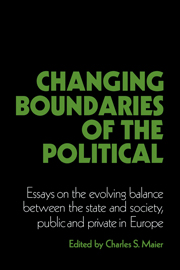 Changing Boundaries of the Political
Changing Boundaries of the Political Book contents
- Frontmatter
- Contents
- List of contributors
- Acknowledgments
- Introduction
- Part I Re-forming the political
- 1 Politics unbound
- 2 Challenging the boundaries of institutional politics: social movements since the 1960s
- 3 Religious transformation and the future of politics
- 4 The politics of time: changing paradigms of collective time and private time in the modern era
- Part II Changing boundaries of political activity
- Part III Uncertain boundaries for political economy
- Index
1 - Politics unbound
Published online by Cambridge University Press: 05 June 2012
- Frontmatter
- Contents
- List of contributors
- Acknowledgments
- Introduction
- Part I Re-forming the political
- 1 Politics unbound
- 2 Challenging the boundaries of institutional politics: social movements since the 1960s
- 3 Religious transformation and the future of politics
- 4 The politics of time: changing paradigms of collective time and private time in the modern era
- Part II Changing boundaries of political activity
- Part III Uncertain boundaries for political economy
- Index
Summary
“Am I both priest and clerk? Well then, amen.”
Shakespeare, The Tragedy of King Richard II, IV. 1.173Absolute politics and the reflexive power of politics
Behind the idea of politics having boundaries, and of these dilating and contracting, it is not hard to discover, in both individual and collective representations, the image of a state of affairs – and the hope for or terror of it – where no boundaries at all are set around the practice of political commitment and the exercise of political will. Everything social would then be placed sub specie politicae, interpreted through politics and seen as transformable by politics. I will call “absolute politics” the state of affairs reflected in that image. It will be the object of this inquiry. This will therefore deal with the circumstances under which politics can be seen as the type of activity entitled to dictate the rules of conduct for all relevant social activities, while these, in turn, are being evaluated essentially for the political consequences they may bear. Under such circumstances political action can be seen as the only type of action capable of transforming society and therefore the only one through which the life of humanity, or of a nation, can be improved to approximate a given ideal. Political vocation as well as participation in politics are predicated as the highest of possible individual choices. They dictate to a person aims which will prevail over those dictated by his or her own self-interest.
- Type
- Chapter
- Information
- Changing Boundaries of the PoliticalEssays on the Evolving Balance between the State and Society, Public and Private in Europe, pp. 27 - 62Publisher: Cambridge University PressPrint publication year: 1987
- 16
- Cited by


